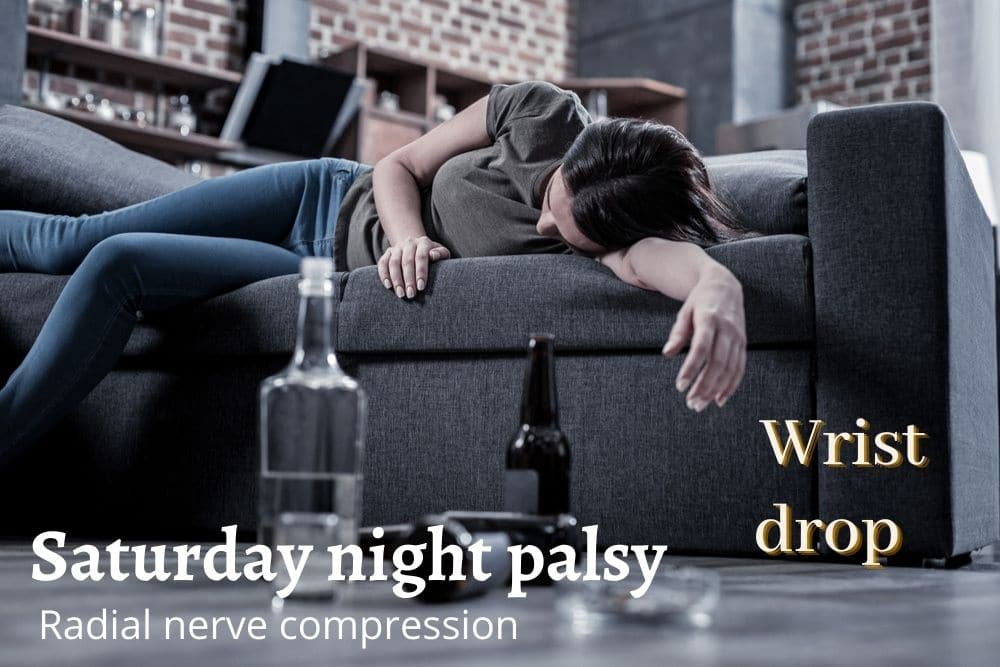Saturday night palsy-A case study
It’s 4am, 1st of July 2015, NYSC Camp Clinic, Wannune, Benue. It was the wake of the Camp’s “Born Fire Night” for the Stream 2 of the 2015 Batch A group of coppers. I heard a knock at the door. Not one of those gentle taps laced with hesitancy and uncertainty, that suggested a frail lady seeking refuge from the blaring monstrosity of the soldiers’ Bugle, and the Herculean drills it announced.
This one was loud, repetitive, recurring in rapid successions- it spelt urgency. A sigh escaped my lips. Just when I thought there was peace in God’s universe!”Come in,” I said reluctantly.And anxiety in the form of a 24 year old young man stumbled in, panting as if he had just outran Bolt in a 100 meter dash. He was making feeble attempts to support a limp left wrist with his right hand, but the damn wrist remained obstinate.
He had gone to bed whole, he said , only to wake up few minutes prior to meet an “alienated” hand who had simply refused to take commands from the rest of his body. He could no longer lift his hand at the wrist. Furthermore, he no longer felt sensations at the back of his hand. In simple terms, he was paralysed from the wrist down to the fingers- a condition known as Wrist Drop.

I marvelled at the “beauty” of the pathology, eyes glittering with interest. I’m sure he must have thought me a psycho, but fact was that he was presenting exactly with the features of some form of Radial Palsy [a Mononeuropathy, i.e dysfunction of a single nerve] we had read in Last’s Anatomy those early years in medical school, and since then have never had the “opportunity” of coming across a real case scenario .
Yeah once in a while you see even aged Professors turn into enthusiastic toddlers visiting Disney Land for the first time, when they see a relatively “rare” case.There was no history suggestive of neck or shoulder region injury, so the Brachial plexus- a network of nerves that is more like the “tree” that gives rise to the “branches” of nerves that supply the upper limbs, of which the Radial nerve is just one; itself, was apparently intact.
There was no history of arm trauma, deformity, or pain- so mid shaft fracture of the humerus was unlikely. I started explaining to him that he had some form of nerve injury, a Neurapraxia [transient loss of nerve function] so to say; that there was this long nerve, the Radial Nerve, that went behind his arm, coiling itself in a spiral fashion around the bone, just like a snake ’round a tree branch, which among other things was in charge of him bending his hand upwards at the wrist; that most likely he slept “carelessly” in such a way that there was direct pressure on the nerve with resultant injury leading to the paralysis he was experiencing.
I went on to explain that it happens mostly to drunks who, after a binge, falls asleep carelessly on a chair, with their hand over the back of the chair in such a way that their armpits rests on top of it; and that because it happens mostly during the weekend, especially on Saturday nights] when people usually got drunk, that it is nicknamed “Saturday Night Palsy”. He yelled that that was his case! He had drank too much the previous night, which incidentally was a Saturday night, and had then fallen asleep on a chair in the position I just described.
Moment of truth. He pleaded for me to give him an “injection” so that it would resolve. I hesitated not knowing how to tell him that there was no magical injection of the sort. He would have to wait on the nerve to heal itself gradually with time. And knowing what nerves are, permanent cells that are unlike the skin that heals rapidly, it may take just a few days, or up to 6weeks to 6months, before Wallerian Regeneration– the type of healing nerves undergo, would have gone far enough to allow him use that hand again.
What we could do then was to splint the wrist, and hang the limb on a sling, to prevent oedema and misalignment of the tendons, which may lead to permanent disability and loss of function even after the nerve function finally returned. I also instructed him to see a neurologist, and a physiotherapist, once he left camp 2 days from then.
With the look on his face when he was leaving, I was sure he wasn’t going to indulge in an alcoholic binge any time soon, or even ever- okay, this is me overreaching. I felt for him, but there was nothing I could do. He simply had to be on conservative management, and maybe some nerve “boosters,” which won’t do much anyway, until the nerves regain their function.
Neurapraxias
Neurapraxias are not really about alcoholic binges; I’m sure most of us must have had milder forms, in nerves other than the radial nerve, when we were fully awake, or sleeping without being under the influence of alcohol. For instance,
- what happens to your legs when you seat in an uncomfortable position in a cramped bus for a long time, stretching the Common Peroneal Nerve in its superficial position at the outer aspect of the leg, about 2 to 4 cm below the knee, as it wounds around the neck of the Fibula bone;
- or sitting on the Sciatic Nerve in its poorly protected position in your buttocks; or hitting the outer aspect of the elbow against a wall, jarring the Ulnar Nerve, giving you the “funny bone” sensation.
Fact is that, stretching of a nerve beyond its “elastic limit”- so to say, or exerting direct pressure on it over a short period of time, as well as a direct knock on a nerve– stuns it momentarily, giving you an electric shock-like, or pins and needles sensation, what we collectively call paraesthesia.
Other times, it may even give anaesthesia- complete loss of sensation, making you feel as if there’s temporary “loss of blood o flow.” In these circumstances, there’s usually rapid recovery of function when the stress/strain on the nerve is relieved. On the other hand, compression, especially over a long time, causes actual nerve damage, leading to some degree of paralysis and paraesthesia, which could take longer time for full recovery.
So, one should be careful to make sure that these nerves in vulnerable positions in the body are not exposed to direct pressure over a long period of time. Usually, when you’re awake, or asleep without being under the influence, the abnormal sensations described above would alert you of ongoing damage, and you’d adjust your positioning. When you’re under the influence of alcohol, however, it becomes more difficult to respond appropriately to stimulus.
About the author

Dr Chibuike Joseph Chukwudum
Dr Chibuike Joseph Chukwudum is a doctor who Studied Medicine and Surgery at Nnamdi Azikiwe University Awka. He is the former Medical Officer at Oakland specialist hospital,obosi.He also previously worked at Nnamdi Azikiwe University Teaching Hospital, Nnewi, Anambra State.